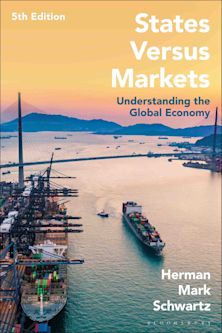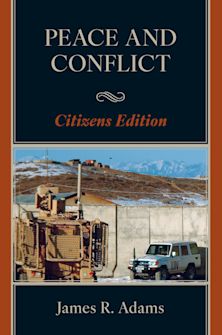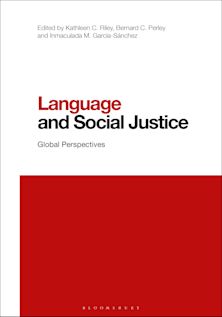- Home
- ACADEMIC
- Politics & International Relations
- Global Politics
- Language in Contemporary African Cultures and Societies
Language in Contemporary African Cultures and Societies
Leonard Muaka (Anthology Editor) , Esther Mukewa Lisanza (Anthology Editor) , Timothy T. Ajani (Contributor) , Gabriel Ayoola (Contributor) , Eyamba Bokamba (Contributor) , James Etim (Contributor) , James Essegbey (Contributor) , Rose Lau Lugano (Contributor) , Martha Moraa Michieka (Contributor) , Mohamed Mwamzandi (Contributor) , Ng’ang’a Nuchiri (Contributor) , Akinloyè Òjó (Contributor) , Anne Rotich (Contributor) , Lendzemo Constantine Yuka (Contributor)
Language in Contemporary African Cultures and Societies
Leonard Muaka (Anthology Editor) , Esther Mukewa Lisanza (Anthology Editor) , Timothy T. Ajani (Contributor) , Gabriel Ayoola (Contributor) , Eyamba Bokamba (Contributor) , James Etim (Contributor) , James Essegbey (Contributor) , Rose Lau Lugano (Contributor) , Martha Moraa Michieka (Contributor) , Mohamed Mwamzandi (Contributor) , Ng’ang’a Nuchiri (Contributor) , Akinloyè Òjó (Contributor) , Anne Rotich (Contributor) , Lendzemo Constantine Yuka (Contributor)
You must sign in to add this item to your wishlist. Please sign in or create an account
Description
Language in Contemporary African Cultures and Societies examines language in contemporary Africa by positioning language at the center of interrelationships between individuals, society, and culture. Because of how language permeates every aspect of human existence within each society, this book has assembled contributions by researchers and scholars who focus on different topics within African languages and cultures. By presenting African languages as resources and subject and subject of the study, this book discusses Africa’s multilingualism, language policy, preservation, and their uses in development, security, liberation, and identity formation in the diaspora. Based on empirical research and analysis of texts, this book takes a closer look at the continent and the diaspora by situating African languages, cultures, and literatures at the center, and shows how African languages are used in the liberation, transfer of knowledge, and promotion of literacy among Africans globally. It is a book that seeks to bridge the gap between the continent and the diaspora. All contributors are experienced scholars of language, literature, education and linguistics. The chapters provide a major means for examining the interplay of language, literature, and education.
Table of Contents
Mohamed Mwamzandi
Chapter Two: Multiple Language Acquisition in Africa and its Theoretical Implications
Eyamba Bokamba
Chapter Three: Promoting and Maintaining Kenyan Indigenous Languages
Martha Michieka
Chapter Four: The Role of HBCUs in the Transfer and Maintenance of African Languages and Cultures
Timothy Ajany
Chapter Five: The Influence of Writing on Oral Traditions? The Case of Nyangbo
James Essegbey
Chapter Six: Language Empowerment for Socio-Cultural and Economic Development in Africa Akinloye Ojo
Chapter Seven: The Role of African Languages in Regional Development: Examples from East Africa
Leonard Muaka
Chapter Eight: The No Language Left Behind Approach to the African Language Question: The Case of Cameroon and Nigeria
Yuka Constantine
Chapter Nine: Alienation: The African Immigrants’ Experience in Adiche’s The Thing Around Your Neck and Bulawayo’s We Need New Names
Gabriel Ayoola
Chapter Ten: The Voice of Liberation in Kilio cha Haki and God's Bits of Wood
Esther Lisanza
Chapter Eleven: African Female Writers and the Concept of Liberation: Writings from Nigeria and Namibia
James Etim
Chapter Twelve: Motherhood and Feminism in Margaret Ogola’s novel, The River and the Source
Anne Rotich
Chapter Thirteen: The Pursuit of Selfhood in Selected Swahili Female Bildungsromane
Rose Lugano
Chapter Fourteen: Ode to the Wanderlust
Muchiri Ng’ang’a
Product details
| Published | 03 Dec 2018 |
|---|---|
| Format | Ebook (PDF) |
| Edition | 1st |
| Extent | 1 |
| ISBN | 9798216241102 |
| Imprint | Lexington Books |
| Illustrations | 1 b/w illustration; 3 tables |
| Publisher | Bloomsbury Publishing |
About the contributors
Reviews
-
Language in Contemporary African Cultures and Societies provides great insights into the richness of the African continent in regards to its indigenous languages. The authors of the book highlight different aspects connected to African languages and literature on the African continent and in the diaspora. They discuss in detail the importance of African languages for communication, collaboration, development, and empowerment. They also delve into areas of research in acquisition of multiple languages and documentation of oral literature. It is a great contribution to the field of African languages and literature.
Alwiya S. Omar, Indiana University - Bloomington
-
This edited volume, some of which written by key players in the field of African languages and linguistics, brings to the forefront the importance of African languages in the economic development of Africa. The role of language in Islamic extremist narratives and counter-narratives and the continuing acquisition of multiple languages by African adults, challenging the popular Critical Period Hypothesis, are some of the significant and timely contributions of the book to the field of linguistics at large. The editors of the book must be commended for bringing new insights, charting a new territory for research and teaching, and more importantly, for recognizing the critical importance of African languages in various areas in Africa and in the African diaspora.
Fallou Ngom, Boston University
-
Language in Contemporary African Cultures and Societies is a collection of original chapters dealing with the social dynamics of African languages and literatures studied, analyzed and commented through multidisciplinary lenses. It diverts the reader’s attention from usual discussions on the adaptation to useful monolingualism as a must for formal education. Instead, it launches a debate on functional multilingualism, first as a hard reality that many African countries live in, especially in urban areas, and mostly as prized assets towards a sustained development of the continent. The highlighted viewpoints are multifaceted in approach and polyphonic in their multidisciplinary engagement. The analyses relate to areas such as linguistics, language acquisition, discursive analysis, futuristic projection, gender interrogations, enacted language policies, literary analysis, film analysis … The book stands as a conversion of views that see African languages as powerful assets for Africa’s and the diaspora’s development and identity consolidation. Rather than attempting to consecrate prestigious monolingualism, encouraging and preserving functional multilingualism, the prime assets for self-valorization, means ‘unlocking language forts’ in order to foster and enhance social empowerment. This is a new vista that Muaka and Lisanza offer us over the landscape of African languages and literatures!
Kasongo M. Kapanga, University of Richmond



































